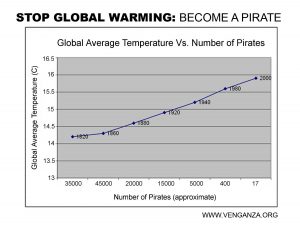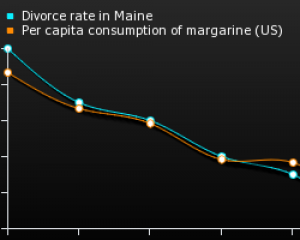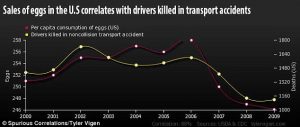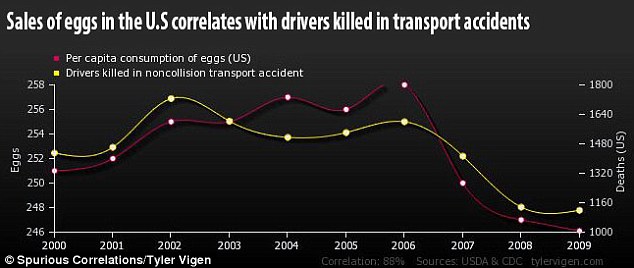 Nerds love to say that correlation is not causation.
Nerds love to say that correlation is not causation.
Correlation happens when knowing one thing allows you to more or less accurately predict another. Sale of ice cream goes up when the temperature does, so knowing the weather allows you to give a pretty good estimate of how much ice cream will be sold. And vice versa.
Causation is when one thing causes the other. It’s very likely that hot weather causes ice cream sales to go up. Statistics rarely allows us to conclude that one thing causes the other. We can only show that things are correlated and then it’s hopefully obvious that one causes the other.
Causation will (almost always) imply correlation. When one thing causes the other, they will be correlated. If there’s a random sale of ice cream all year long, but hot weather causes more sales, there will be a higher than average sale during hot weather and the two will be correlated.
Normally, the other direction does not hold. For example, if hot weather and ice cream sales are correlated (which they are), we cannot conclude that ice cream sale causes hot weather. Or I’ve just found a very tasty way of getting rid of winter depressions.
If two thing are correlated, it is possible that one causes the other or vice versa. We cannot a priori say which. It is also possible that the two thing are both caused by a third factor. For example, there’s a correlation between the number of days until Britmas and ice cream sales. That doesn’t mean that lack of ice cream sales causes Britmas nor that Britmas causes lack of ice cream sales. Rather, the end of the summer causes Britmas to get closer and the weather to get colder. When the weather gets colder, ice cream sales fall. Then end of the summer causes Britmas and falling ice cream sales.
 It’s also possible that two things have nothing in common. A lot of things are correlated by pure chance. For example, there’s a correlation between the human population and my age. Yes, that’s true: I cause life! I’m literally like Jesus except real. Also, there’s a correlation between the number of babies and ebola. There’s nothing suggestion either is causing either, nor that there’s an obvious external force that causes both. It’s just natural that some things grow over time and therefore technically are correlated without there actually being any relationship between them.
It’s also possible that two things have nothing in common. A lot of things are correlated by pure chance. For example, there’s a correlation between the human population and my age. Yes, that’s true: I cause life! I’m literally like Jesus except real. Also, there’s a correlation between the number of babies and ebola. There’s nothing suggestion either is causing either, nor that there’s an obvious external force that causes both. It’s just natural that some things grow over time and therefore technically are correlated without there actually being any relationship between them.
Correlation and causation are complex things. So complex that even if you work with them, it’s hard to always get a grasp of. In fact, humans are terrible at the relationships.
For example: do you also feel that we are getting busier and busier both as a species and as individuals? That we have less time for what really matters and that it seems life just passes by without us noticing? Do you yearn for a simple time, where people had time for one another? Well, then you’re completely wrong.
We probably have more free time than any generation before us. In the Netherlands, we work 40 hours a week and have 5-6 weeks of vacation. But a lot take a father/mother day and only work 4 days a week at 32 hours. A lot of families even have one parent working part-time or not at all. In Denmark, a regular work week used to be 37.5 hours, but I think it’s down to 36 hours in most places now. Some places even lower. Even if we leave communist Europe and go to the states, and assume a 50-60 hours week, this is dwarfed by a typical working week in the 19th century at 60-70 hours a week.
We start working later, and we stop (relatively) earlier. Most of us probably didn’t work at all the first 12-15 years of our lives, and few were doing more than half time before our 20th year. Even if we pretend school is work. And most of us will retire at age 65-70, but will then still expect to have 20-30 years left to live.
In addition, we have machines to do most of our actual work. Machines do the dishes, clean floors, do laundry, etc., etc. Realistically, we work less and have more time for leisure than ever before. Then how does it seem that we are more busy?
Well, the reason might be that we are paid more. We know that if something is scarce, it’s expensive. Like diamonds or honest lawyers. Diamonds are not actually scarce; they are just artificially limited by monopolies to be rare and therefore expensive.
 Our brain fucks up the causal dependency “scarce implies expensive” and flips it around 360 degrees. Then another 180 degrees just for good measure. Then it becomes “time is expensive implies time is scarce.”
Our brain fucks up the causal dependency “scarce implies expensive” and flips it around 360 degrees. Then another 180 degrees just for good measure. Then it becomes “time is expensive implies time is scarce.”
We all get richer. The poorest in the western world are wildly better off than the average 100-200 years ago when people basically got polio for their 12th birthday. 100 years ago some rich dude (quoting from memory from Bill Gates’ The Road Ahead) had a bunch of radios installed in the basement of his mansion. That way, they could each be tuned to a station and the bloke had the convenience of being able to listen to any station without having to twiddle with the tuner, which apparently was a big deal back then. Today, it is hard to find a cell-phone that cannot do much better than that, streaming on-demand from pretty much all music that’s ever been made. Sure, some may be better off than others, but the fact still stands that most if not literally all are better off today than 100 years ago.
Furthermore, most get richer as time progresses. Salary increases as we grow older and more experienced. While inflation takes its cut, most people are largely blind to that and just look at the raw numbers.
 Thus, we get richer, both on a global scale as a species and on a personal scale with personal development. Since we get paid more for our time, it must be more precious. If it’s more precious, it must be rarer. But it’s really not. We have more time than ever and just don’t notice it. Be it we take a 5 minute Facebook break during work, or an extra long lunch break enjoying the sun. Be it we spend time on personal development, or Netflix our way they Gossip Girl another time just to see if B is less of a bitch this time around. Or perhaps we’re just so busy telling ourselves how overworked we are, we don’t have time to actually do anything.
Thus, we get richer, both on a global scale as a species and on a personal scale with personal development. Since we get paid more for our time, it must be more precious. If it’s more precious, it must be rarer. But it’s really not. We have more time than ever and just don’t notice it. Be it we take a 5 minute Facebook break during work, or an extra long lunch break enjoying the sun. Be it we spend time on personal development, or Netflix our way they Gossip Girl another time just to see if B is less of a bitch this time around. Or perhaps we’re just so busy telling ourselves how overworked we are, we don’t have time to actually do anything.
But that’s far from the only case where we get causation wrong. What initially prompted me to write this piece is that a friend of mine posted this article, which basically says that sometimes it’s better to delay a search program because people don’t trust it if it’s too fast. We know that good work takes time, so if something is fast, it cannot be of good quality. Just like we would be suspicious if a fancy restaurant brings your food immediately (even though you’ve reserved days or weeks in advance and don’t order a la carte because you’re not a pleb) We do not believe that a computer can do a good job if it responds in less than a second. Again, we flip the causal relationship in our minds. Studies show that the best way to make a piece of analysis software more believable is to put in a random delay of 5-15 seconds.
A good example of this is the Benjamin Franklin effect, which basically says that a person is more likely to do you a favor if they have already done you a favor than they are if you have done them a favor. One of the beggars around town mush know about this effect; her strategy is always to ask people for a cigarette or for a light. Regardless of whether she gets the smoke/light, she then proceeds to as for 2 euros. She knows that if she can people to do her a small favor (giving her a light), they are more likely to do her a larger favor. I’ve seen her put out the cigarette immediately after asking for the light.
The effect is named after Benjamin Franklin – there’s a shocker – who had a feud with a dude. Probably one of the pretentious ones from Days of the Tentacle. He wanted to end the feud, but did not want to concede anything to his opponent. Instead, he asked his opponent to loan him a rare book. Franklin was apparently a big reader, and the colonial times Internet was probably all congested, so he was way into books. This was well-known, so his opponent was flattered that famous reader Ben Franklin (named after the US $100 bill) would ask him for a book, and let him have at it. After that, the opponent stopped carrying a grudge against Ben, and they almost became friends.
The effect is believed to have the same screwed up relationship between cause and effect: we like to do nice things to people we like, so we must like people we do nice things to. The effect is so strong that it overshadows actually doing nice things to other people, which you would think would make them more prone to appreciate you.
We do the same swap subconsciously all the time. We invent reasons rationalizing our beliefs and believe that our rationalizations are the causes for our opinions.
At work, I’m expected to take a bunch of certifications. I try avoiding it because I know that once you work to get a certification, the certification becomes the reason you work to learn something, and the joy of learning steps into the background. If you need to get a certification, you learn what is needed for the certification, not what is useful. This is all good and well. It is a good reason, and it is largely experimentally demonstrated that (some) people in (some) situations really behave like this (a study where kids were rewarded for drawing demonstrated that the kids got significantly less reward from just drawing, even if they loved it before – the reward was the reward, not the drawing).
In my spare time, I’ve started studying. I could just diddle around on the internet, read books and listen to lectures. In fact, I have done that for over a year now, and have found it very interesting. However, I think a bit more structure would be good, and if I have a goal to strive towards, I believe it will be easier to keep myself motivated. So, I signed up for university classes even though that’s rather expensive.
Notice anything? Both of those arguments are both very good rationalizations. They both seem like perfectly good reasons for acting in the way I have done. Yet, the arguments can easily be swapped around. It’s literally the same situation. Yet, in one case I pay literally thousands of euros to get a degree whereas in the other case I don’t accept a free certification which would be a small amount of extra work.
My reasons for acting are not what I tell myself they are. It’s not obvious what the reasons are; perhaps I’m subconsciously afraid of failing a certification exam (or at least getting a less than satisfactory grade)? Perhaps I just find it funnier to have a bachelor’s degree in a topic that I am very unlikely to ever use professionally, or just like the idea of being able to arrogantly claim that you are not properly educated with anything less than two university degrees.
I could give many more examples like the certification/education one, but that’s a topic for a later post. For now it suffices to conclude that often the effect comes before the cause, and just the mere existence of a correlation is the causation.

